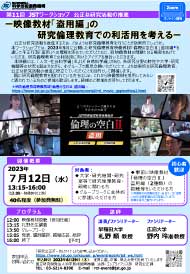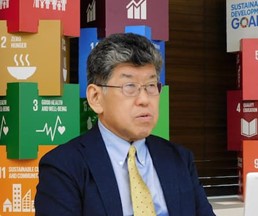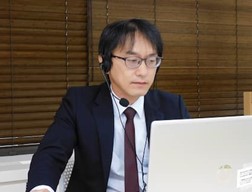Event Reports
The 11th JST Workshop "Promoting Activities toward Research Integrity - Effective Utilization of the Research Ethics Instructional Video, Gaps in Ethics 2 - Plagiarism Edition"(12 July '23)

Lecture
"Effective Utilization of the Research Ethics Instructional Video, Gaps in Ethics 2 - Plagiarism Edition" by Professor Jun Fudano, Waseda University

Professor Fudano gave a lecture at the beginning of the workshop.
Professor Fudano's goals for this workshop were:
1) To understand and explain the purpose (learning and educational goals) and content of Responsible Conduct of Research (RCR) education
2) To suggest RCR education/training methods using the instructional video "Gaps in Ethics 2 - Plagiarism Edition"
With these two goals, he stated, "Through ethics education, I hope that each of us will not only acquire knowledge, but also acquire the skills to make appropriate decisions by ourselves when faced with ethical issues." Next, he talked about the systematization of RCR education conducted at Tokyo Institute of Technology, as research institutions are working on research ethics education based on the MEXT guidelines. He indicated that promoting RCR education requires ethical decision-making and problem-solving skills, as well as education in the affective domain, and that active learning is required rather than traditional passive learning.
In addition, he talked about the philosophy of education regarding the status of RCR education in recent years. He said that it can be practiced by learning to comply with laws and regulations (Regulation-Based) or by thinking about what is good and acting accordingly (Virtue-Based). Regarding the latter, he talked about the VERITIES Initiative (Michigan State University, https://veritiesinitiative.msu.edu/) and SOPs4RI (Standard Operating Procedures for Research Integrity, https://sops4ri.eu/) as examples of overseas initiatives.
Finally, he gave examples of research ethics education using "Gaps in Ethics 2" in relation to the RCR education goals at Tokyo Institute of Technology.
Group Work: Analysis of video material and study of utilization methods

During the group work, participants exchanged various opinions on topics such as research ethics education at their own institutions. Lastly, the following presentations were made on the results of the group work, which were reviewed by Professor Fudano and Associate Professor Rei Nouchi of Hiroshima University, who cooperated as a facilitator.
● Humanities and Social Sciences Edition
The video depicted scenes in which a character has had a habit of copying and pasting and other forms of plagiarism since their student days and continued their research with a false sense of ethics. During the group work, there were presentations on the importance of ethics education starting with undergraduate students, creating standards related to plagiarism and secondary source citations, and the need to recognize the importance of research records.Professor Fudano commented, "It is necessary to learn research integrity starting in the undergraduate years, and it is important for students to have an opportunity to share values about the purpose of research. It is also necessary to think about what 'good work' means for researchers."
● Natural Sciences Edition
The video material depicted scenes regarding subjects such as low awareness of ethics, poor communication in the laboratory, and a lack of data management and authorship . During the group work, there were presentations on the need to educate people to be aware of attributing results to others such as retirees in their laboratories.Associate Professor Nouchi said, "I think they got to the specifics of laboratory management. It is also important to create a climate in which people can understand that whistleblowing is an act that improves the research environment. It would be more effective to think about teaching in a broader sense."
Overall Review
Associate Professor Nouchi commented, "There were many ideas from different perspectives, and it was a great learning experience for me. I hope that you will use today's opinions in your own organization."Professor Fudano said, "As someone who helped make the video, I would like them to be used actively. Videos have the potential to produce different educational results from textbooks or e-learning. When doing educational activities, it is important to present educational goals to students and faculty from the viewpoint of educational effectiveness. I felt that there were many examples of clearly stated goals in the group presentations. This workshop also brought together people interested in improving research ethics education and allowed them to exchange information. When multiple people work together, they can accomplish things that cannot be done by a single institution. I hope that as we continue doing these workshops in the future, we can build a community of people who believe in the importance of promoting sound research activities."

We received the following comments from the participants through the questionnaire.
- I heard many opinions on the concept of plagiarism.
- I can easily understand plagiarism in relation to my own research institution.
- I was able to learn about recent trends from the lecturers. The group work helped me realize things that I have not noticed from my perspective or experiences.
Event Report, The 10th JST Workshop

